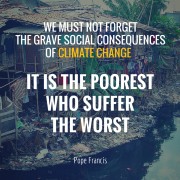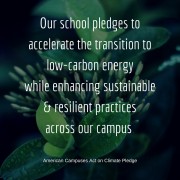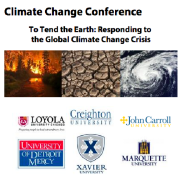Our Addiction to Coal: Submerging Life as We Know It?
BY JAMES HUG S.J | June 11, 2014
It is the perfect ironic parable for our times. Norfolk, VA, the largest naval port in the world, has the largest sea level rise on the East Coast of the U.S. – as much as a foot since the 1930s. And experts expect another foot and a half by the 2060s.
Look at what that means for some of the proud early 20th-century-era buildings in downtown Norfolk:
This Unitarian Church has to schedule its services and other events carefully so that people attending them won’t be stranded at high tide. The church website features a link to a tide chart. Skip Stiles, the Executive Director of Wetlands Watch, told NPR, “You can sort of mark where the storms have come over the years and you can see the progress of these storms as they come farther and farther up onto these buildings.”
The irony? Virginia is a major coal-producing state, and the largest coal shipping port in the country, Pier 6, is in this region. As the sea level rises, as the tides advance, and as storm waters put their destructive marks on more and more of Norfolk and Hampton Roads, “long trains full of coal from throughout Appalachia empty their loads into waiting ships for export around the world.” Coal-fired power plants are, of course, one of the largest single emitters of the Greenhouse Gases that fuel climate change. Norfolk is itself a parable throwing light on the heart of the debate over climate change and coal.
Why does this self-destructive behavior continue? Because jobs are scarce and precious, global poverty is rampant, and we are addicted to cheap energy. “We’re going to continue to use coal,” Democratic Senator Tim Kaine says. “I mean nobody is saying, ‘Just throw a brake on the 35 or 40 percent of American energy production that’s coal.’ So in Virginia, we have coal to worry about. We also have sea level rise to worry about.”
That perspective is short-sighted and naïve for sure. Climate scientists are in agreement that the human family is running out of time as Earth’s ecological systems rapidly approach a tipping point. Once that tipping point is reached, the processes of climate change, sea level rise, and other interrelated destructive forces will be beyond our capacity to change. They will take on an escalating forcefulness that will overwhelm human efforts to stop or reverse them. And billions of people will be devastated worldwide.
When our amazement at Norfolk subsides a bit, we need to face the fact that the self-destructive pattern so clearly reflected in this ironic “parable” is replicated in a variety of forms around the industrialized world. “Downward mobility in lifestyle?” No – people want to see their children do better than they did economically. “Stop the overuse of natural resources on the planet?” No! The cultural pressure for ever-increasing economic growth is unrelenting. “Share limited resources with the billions of poor in the world?” No, we need what we have and we’ve earned it! “Transfer quickly to renewable energy resources?” Not if it means our current jobs and livelihoods are threatened.
These are all real tensions. We need realistic solutions that will inspire broad social change, reduce Greenhouse Gases quickly, provide jobs and attend to the needs of those who lose their jobs in the necessary transitions, shift cultural notions of success and the good life to community values that fuel care for the planet sustainably. Above all, we must deepen the sense that we are all in this self-destructive cycle together – globally. We are one human family.
If we don’t rise to face these challenges together soon, the tides of climate change are sure to submerge life as we know it in most places on the planet.
James E. Hug, S.J., has a long history working in social ethics and social justice advocacy in the Catholic community. He served 24 years as the President of the Center of Concern, a Washington, DC based social justice institute rooted in Catholic social tradition, working for greater economic, social, and ecological justice globally. He holds a doctoral degree in Christian ethics from the University of Chicago and a master’s degree in Christian spirituality from St. Louis University.
Fr. Hug’s research has focused on issues of faith and economic justice and he has lectured and directed workshops throughout the U.S. and in Europe, Asia, Africa, and Australia. Currently he serves as sacramental minister for the Adrian Dominican Sisters and writes on issues of spirituality for social transformation in these difficult times. His blog, “Truth that does Justice,” can be found on the website for the Dominican Center: Spirituality for Mission, www.dominicancenter.org.
Past publications have included Catholic Social Teaching: Our Best Kept Secret, Social Revelation: Profound Challenge for Christian Spirituality, and Tracing the Spirit: Communities, Social Action, and Theological Reflection. Jim has also written chapters for Globalization and Catholic Social Thought: Present Crisis, Future Hope and The Pastoral Circle Revisited: A Critical Quest for Truth and Transformation.
Fr. Hug’s research has focused on issues of faith and economic justice and her has lectured and directed workshops throughout the U.S. and in Europe, Asia, Africa and Australia. He was the editor of the Center of Concern’s “Catholic Social Teaching: Our Best Kept Secret, author of Social Revelation: Profound Challenge for Christian Spirituality,” and the editor of “Tracing the Spirit: Communities, Social Action, and Theological Reflection.” Jim has also written chapters for “Globalization and Catholic Social Thought: Present Crisis, Future Hope” and “The Pastoral Circle Revisited: A Critical Quest for Truth and Transformation.”












Leave a Reply
Want to join the discussion?Feel free to contribute!